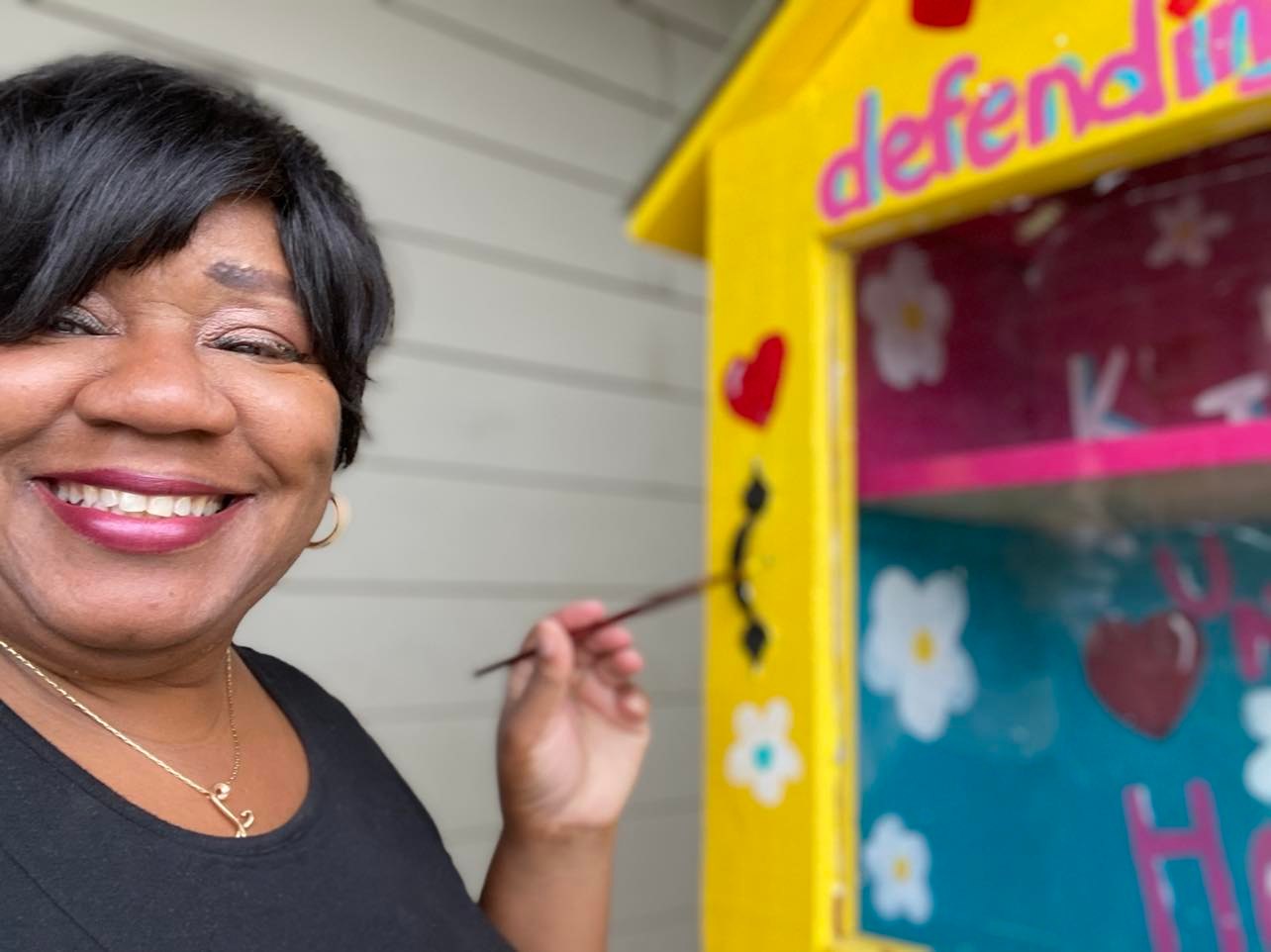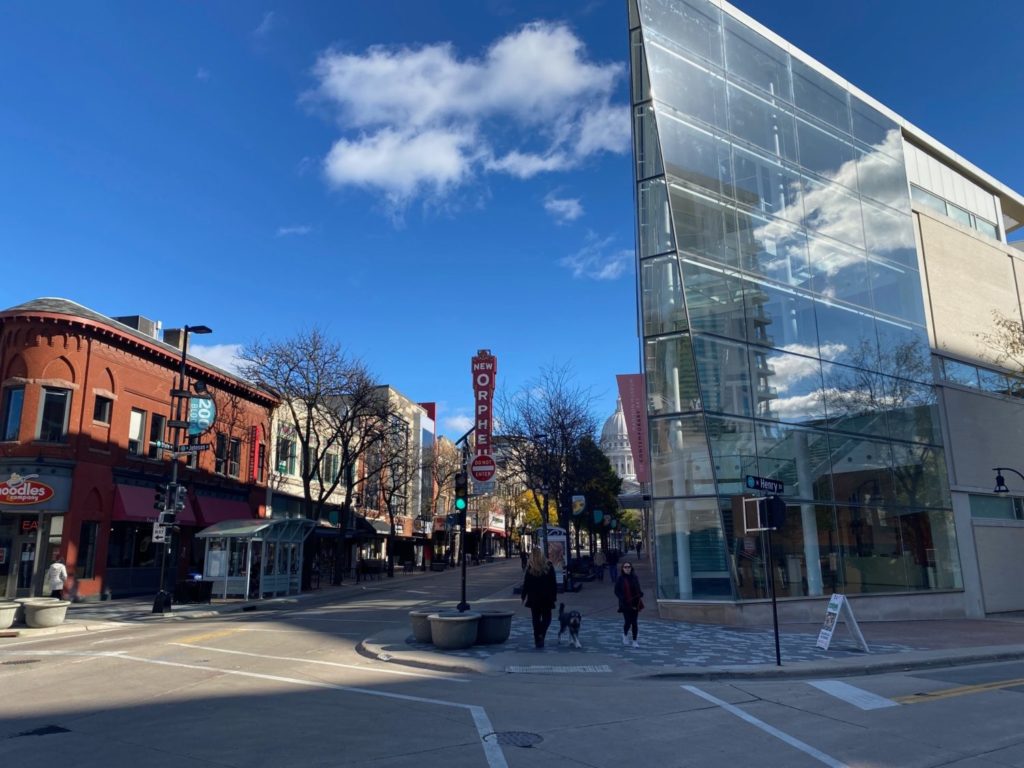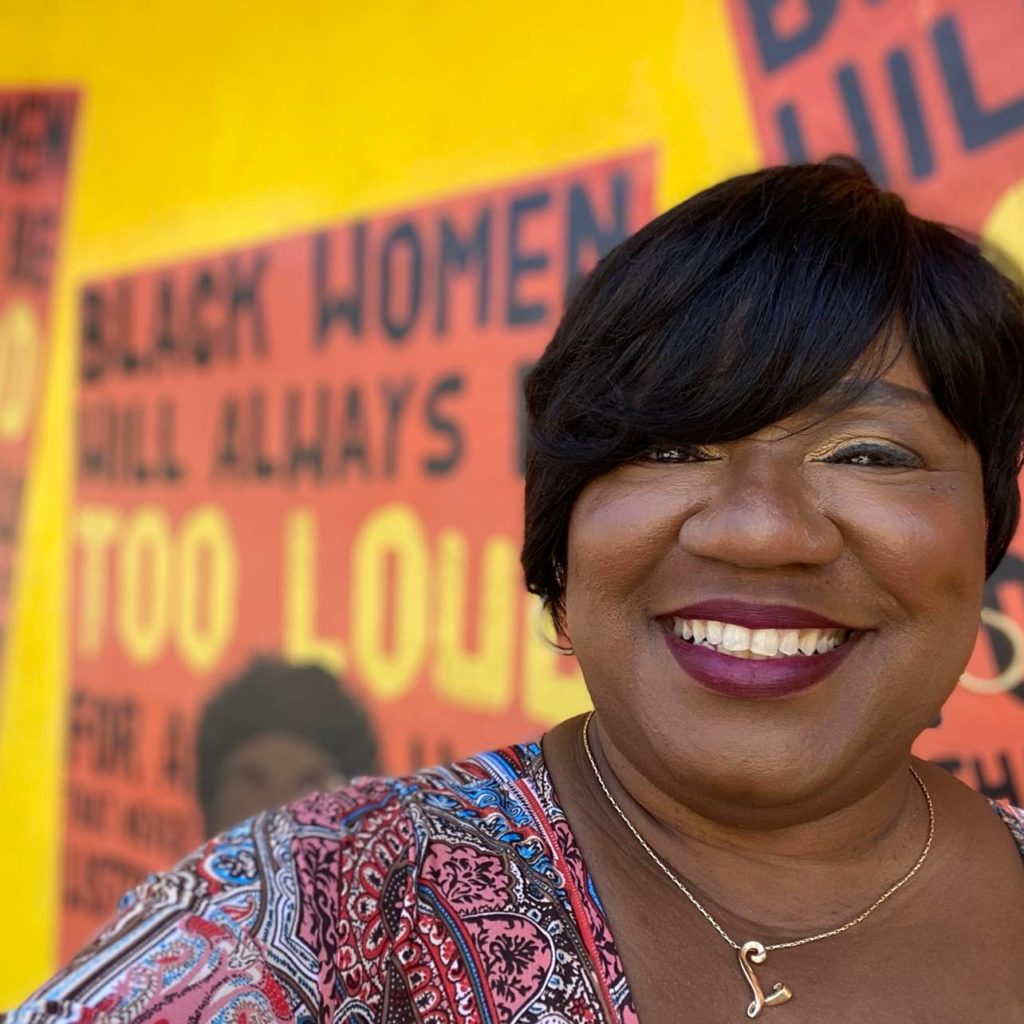
Beloved Madison artist Lilada Gee was excited to be one of the featured artists for an upcoming exhibit for the Wisconsin Triennial titled “Ain’t I A Woman?” at the Madison Museum of Contemporary Art (MMoCA) in downtown Madison. The exhibition explores the intersection of race and gender as well as the underrepresentation of Black women artists in Wisconsin.
That excitement came to a crashing halt recently when Gee was verbally assaulted and belittled by a physically aggressive Overture Center of the Arts employee as Gee tried to re-enter the building where she was working on her art.
Overture Center Chief Equity and Innovation Officer Ed Holmes said the employee has been terminated. He declined to identify the employee.
Annik Dupaty, who has worked at MMoCA for almost 12 years and has been in the building shared by the Overture Center and MMoCA for over a decade, saw the incident between the woman and Gee up close.
“I want to convey to you how horrific this really was, because I have never seen anyone treated this way in all of my years here. It was absolutely appalling,” Dupaty, who is also Black, tells Madison365. “Collectively, the entire experience of being a Black woman treated this way in a space that I spend more waking time in than I do with my own family … it’s a lot. It has changed the way that I feel coming in those particular doors … and I do hope that this gets addressed.”
Last August, MMoCA announced the selection of Fatima Laster, the owner, operator, and curator of 5 Points Art Gallery + Studios in Milwaukee, as the Wisconsin Triennial’s first Guest Curator. “Ain’t I A Woman?” will highlight an intergenerational group of women working across different disciplines, including murals, printmaking, sculpture, painting, performance, textiles, and more.
“One of her thrusts was to create more opportunity for Black women artists that we don’t often get on this level of exhibition and engagement,” Gee says. “I was so excited to be painting a mural for this exhibition and MMoCA created some space for me to paint the mural on their facility.”
While working on her artwork on March 9, Gee had to go out to her car to get some additional supplies and called Dupaty, MMoCA director of events and volunteers, to let her back in the building.
“While I was waiting for her, there was a white lady waiting in the door well,” Gee says, adding that she almost knocked on the door to get out of the cold, but decided against it. “I was thinking, ‘There’s probably strict rules. Don’t let anybody in you don’t know.’ I didn’t want to make this an awkward situation for myself or for this woman,” Gee remembers.
So Gee just stood outside in the cold by the double doors on Henry Street. Is it possible the woman couldn’t see her?
“There’s no way she couldn’t see me standing there waiting. I had my big old coat on … juicy Black lady in a juicy white coat. She saw me,” Gee says.
Still, she waited for Dupaty to get there to let her in who soon came and they stepped through the first set of doors together. “As I stepped through the doors, Annik is like, ‘Hi, Lilada. Come on in!’ The next thing I know, this woman is right in my face yelling at me at the top of her lungs. ‘What are you doing?!? You can’t come in here! You’re not supposed to come in this door! You have to go around!'”
All of this was happening in front of Dupaty, who was equally stunned, having worked in the building for a decade. She says the woman was not familiar to her.
“I came downstairs with key in hand, swiped the card. I’m not wearing a coat, so clearly I’m an employee. I came down and I opened the first set of doors,” Dupaty remembers. “I went around the woman standing there. I opened the door for Lilada and began to greet her and this woman just basically was inches away from Lilada’s face and said, ‘You can’t come in here! You have to go around and use another set of doors,’ in a raised, condescending voice that was absolutely appalling but layered into this was the physicality of it … really like jumping into Lilada’s personal space.”
Gee says that she was just frozen. “My brain is trying to make sense of what is happening … because there was nothing that gave me a clue that this was about to happen. It felt like she was an inch from my face yelling. I thought, ‘Is this a joke? Is this someone I know that is trying to be funny?’ She had a mask on, so I couldn’t fully see her.”
Gee says that she sidestepped the woman who proceeded to walk in front of her once again preventing her from walking through the door.
“I sidestep her again and she walks, physically again, putting herself between me and the door while constantly yelling in my face,” Gee recalls. “Annik says, ‘What are you doing?!? This woman is an artist working on the artwork here for an exhibition. She has permission to be here to paint.’
“Annik questions the woman, ‘Do you work for the Overture Center?’ The woman says, “Yes.'” Gee adds. “The woman instantly becomes more demure.”

(Photo by David Dahmer)
Both women felt the episode was not just disrespectful to Gee, a beloved artist in the Madison community, but also Dupaty, a longtime employee in the building.
“So not only did this woman bypass me as a longtime staff person – a Black, biracial woman working here, stepping around me as if I didn’t exist,” Dupaty says, “but she addressed Lilada in ways that I can’t even describe to you how disrespectful it was physically and verbally.
“It was so shocking that it took my breath away,” she adds. “The woman was extremely aggressive. I’ve never seen treatment like that in my years working here.”
Gee went back into the room that she was painting in and just tried to gather herself and get back to her work. But she couldn’t. Dupaty reported the incident to Christina Brungardt, the director of the Madison Museum of Contemporary Art, who immediately came down to apologize to Gee and make sure she was OK.
“I’m just shaken at this point. Even now, there’s just this pit in my stomach,” Gee says. “My attention was to just push through what had happened but I’m thinking to myself, ‘How am I supposed to paint this mural about Black girls if I can’t even get in the building? I’m being physically prevented from being in this space.
“I was going to do the Black woman thing. Just put my head down and do what needs to be done no matter how I’m feeling,” she adds. “My daughter came to pick me up and I started crying. ‘Why didn’t I react? Why didn’t I respond?’ And my daughter says, ‘Mom, you just had a trauma response.’”
Gee is the founder of Defending Black Girlhood, which focuses on the work that Black women and the community, at large, must do to make the world a safer place for Black girls to live, learn and be loved. She is also the founder of Lilada’s Livingroom and Black Women Heal, organizations that help women and girls deal with the trauma of abuse.
Gee has had a diagnosis of PTSD and she says that she believes there are many other Black women who have gone through significant trauma in their lives as well as the layering of historical trauma. “These types of incidents have a great impact on us increasing our levels of stress that lead to stress-related diseases,” Gee says.
“Every time I try to paint, I just feel the angst of this whole situation and I can’t think positively about what I am trying to do. I keep flashing back to the situation. I’ve been crying. It has really triggered me,” she adds. “This woman was yelling so hard at me … feeling like she had control over me. It’s hard to exactly explain. Like she could fully control who I was and what I can do … control my access. Just the physicality of her being in my face yelling.
“In the 1800s, any white person could detain a Black person – a free Black person – at any time for any reason. It was in the law books. It reminded me of that.”
Gee goes over the incident in her head. A staff person let her in. And she was right there. Greeting her. She was a featured artist. Why did this happen?
“It’s not lost on me that the staff person was also a Black woman. Still, she saw a staff person come from inside of the building to open the door for me,” Gee says. “Not only did she injure me, but she also usurped Annik’s authority to make a decision that I was allowable into the building through that door.”
By putting her body between her and the door over and over again, Gee says, the woman made it physical.
“There’s a bigger issue at hand here … and I realize that. I think we have to get to the bottom of this,” Gee says. “There have been different levels of society that have been integrated, if you will… to me, this high arts space is one of the last frontiers of engagement and equality and representation.”
I point out that I’ve been through those doors many times – no questions asked.
“She wouldn’t do this if I was a white man. She wouldn’t do this if I was a white woman. She wouldn’t have done it if Annik was a white woman,” Gee says. “So what made her do this to me that day?”

Gee’s artwork remains uncompleted. It was supposed to have been done last Friday.
“This has obliterated the timeline for which I was supposed to get my mural done. I refuse to go back there to paint. As a lifelong resident of Madison, this is heartbreaking to me,” she says.
Gee says she hasn’t received an apology from Overture Center. Holmes of Overture Center says staff did reach out but Gee expressed that she didn’t want to deal directly with the organization, but would be represented by her brother, Dr. Rev. Alex Gee. Holmes said Overture staff intends to meet with Alex Gee next week.
“Out of respect for Lilada, we are going through this process as she wishes,” Holmes says.
Dupaty is also hoping for a resolution.
“A meeting is in progress of being planned, but as of today, there has not been a resolution. I haven’t directly received a note, a call or an apology,” Dupaty says. “There was a third-party relay which to me is not acceptable. For organizations in this era of social justice, it is appalling to think someone would treat any person this way. When you think of an organization that says that it wants to make this a welcoming place for all people, and you have a staff member who would treat a guest that way, any guest, that’s appaling.
“It matters that Lilada was an honored guest and that a staff member that works here was providing the access, but the point is that all humans should be treated respectfully when stepping into this building,” Dupaty adds. “That is the work that we are trying to achieve on our side of the building (MMoCA) and we are really hoping that the Overture Center steps up their game and prepares their staff to be welcoming to all people in a real way.”
Holmes says the incident “goes against everything we believe in” and that the internal investigation and response “was done as quickly and expeditiously as possible.” Holmes notes that Overture has made intentional efforts in recent years to be more inclusive and accessible.
“We can’t allow one person to dismantle six years of work we’ve put into diversity, inclusion and equity,” he says.
All organizations in Madison could take note of this negative incident, Dupaty says.
“Think about how they are preparing staff to be welcoming into their spaces. I really don’t know that people understand how this impacts a person beyond just a moment, because it really does call up past experiences of being barred from coming into certain establishments and places,” she says. “We know this whole history that is well documented of Jim Crow-type of laws and behaviors. We are supposed to be in a whole different place in this day and time.”
Gee says she is sad that she didn’t get to complete her mural for “Ain’t I A Woman?”
“The irony of this all is that I was doing this so Black women could have access … but then a Black woman came and walked through the door,” Gee says.
“What made her feel bold enough to treat someone like that? She must have felt some level of authority … some level of power to feel like she could do that without repercussions,” Gee adds. “And now I’m left with dealing with my own trauma response from this and feeling so deeply othered in a city that I grew up in. I’ve been going to that building since I was 10 years old. It’s not the first time I felt othered in there, but I never felt physically assaulted like I did that day.”



